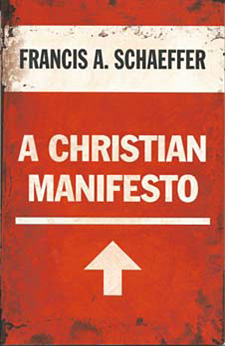Schaeffer’s Manifesto
Despite his ongoing treatment for cancer, Schaeffer continued to write. In 1981 he published A Christian Manifesto.34 It was very specifically aimed at the American landscape and the political developments that seemed to be leading the nation toward destruction. Basically, it dealt with the question of “what is the Christian’s responsibility to government, law and civil disobedience?”35

The book was written in direct response to the Communist Manifesto of 1848, the Humanist Manifesto I of 1933 and the Humanist Manifesto II of 1973 — all of which placed Man at the center of all things and made him the measure of all things.36 In contrast, Schaeffer affirmed the biblical view of Man made in the image of God with “real humanness.”37
Schaeffer showed how our nation was originally based upon a Christian consensus that recognized the dignity of Man and the sanctity of life, while realizing that Man is fallen and therefore must be restrained through a government of checks and balances and separation of powers.38
He then proceeded to show that the foundations of our legal and governmental systems have eroded to the point where “secularized, sociological law” now reigns supreme.39 Regarding this point, he referenced a statement by the former Chief Justice of the Supreme Court, Frederick Vinson (1890-1953) who wrote: “Nothing is more certain in modern society than the principle that there are no absolutes.”40
Schaeffer explained that “sociological law” — or what could be called “situational law” — is operational when the courts make decisions that are divorced from a standard like biblical or constitutional principles. Instead, the courts base their decisions on what is thought to be best for society.
As an example Schaeffer pointed to the Supreme Court’s abortion decision in 1973. He asserted that it was a classic example of highly subjective legal decision making.41 It was a totally arbitrary decision forced upon the majority by an elite without any constitutional basis and in complete contradiction of God’s Word. (The same, of course could be said of the Court’s equally arbitrary ruling in the same-sex marriage case 43 years later in 2016.)
Schaeffer launched into a detailed discussion of the relationship of Christians to their government. He affirmed the biblical teaching that we are to respect and obey our rulers.42 But he hastened to emphasize that there are biblical limits to obedience. “The bottom line,” he asserted, “is that at a certain point there is not only the right, but the duty, to disobey the state.”43 And when is that? “Any government that commands what contradicts God’s Law abrogates its authority.”44
Schaeffer concluded his manifesto by pointing out that Humanism is “an exclusivist, closed system which shuts out all contending viewpoints — especially if those views teach anything other than relative values and standards…As a result, the humanistic, material-energy, chance world view is completely intolerant…”45 He therefore concludes:46
It is not too strong to say that we are at war, and there are no neutral parties in the struggle. One either confesses that God is the final authority, or one confesses that Caesar is Lord.
One very fascinating thing about Schaeffer’s manifesto is what he had to say about the presidential election of 1980 in which Ronald Reagan was triumphant. Writing in 1981 during the first year of Reagan’s presidency, he refers toit as “a unique open window” for our nation to roll back the tide of Humanism.47 He warned that “we must beware of letting a foolish triumphalism cause us to think that all is now won and certain,”48 because the Humanists “are deeply entrenched.”49
Speaking prophetically, Schaeffer then concluded that if we were unable to stem the tide of Humanism during the Reagan open window, it would most likely continue to be advanced in the future through the courts.50 “Under the guise of ‘civil liberties’…the Humanist forces have used the courts rather than the legislatures because the courts are not subject to the people’s thinking and expression by the election process — and especially they (the courts) are not subject to reelection.”51 And so it has been.
The Last Book
Schaeffer concluded his life’s work the way he began it, by condemning the Church for its apostasy. His message was contained in a book published in 1984, three months before his death. The book was titled, The Great Evangelical Disaster.52
In 1948, as he and his wife were preparing to move to Europe, Schaeffer had written an essay titled, “Revolutionary Christianity,” in which he argued that the true revolutionary version of Christianity was not the popular “socialized gospel” of that day, but the “historic, Bible-believing Christianity that believes the task of the Church is to preach Christ and Him crucified and that men are justified by faith.”53
He renewed this theme in his last book. He asserted that just as the mainline denominations had been corrupted in the 1920s and 1930s by their abandonment of Scripture, the same thing was occurring in the 1970s and 1980s among Evangelicals.
He proclaimed that “the great evangelical disaster” was the failure of the evangelical world to stand for truth as truth.” And then he bluntly stated, “There is only one word for this — namely, accommodation: the evangelical church has accommodated to the world spirit of the age.”54
How exactly? In two ways. First, Schaeffer identified the accommodation on Scripture, “so that many who call themselves Evangelicals hold a weakened view of the Bible and no longer affirm the truth of all the Bible teaches — truth not only in religious matters but in the areas of science and history and morality.”55 The second area has been on moral issues, “with no clear stand being taken even on matters of life and death.”56
Schaeffer strongly castigated Evangelical leaders for waffling on the issue of the inerrancy of the Scriptures, “so that the full authority of Scripture is completely undercut.”57 Here’s how he summarized the issue:58
Unless the Bible is without error, not only when it speaks of salvation matters, but also when it speaks of history and the cosmos, we have no foundation for answering questions concerning the existence of the universe and its form and the uniqueness of man. Nor do we have any moral absolutes, or certainty of salvation, and the next generation of Christians will have nothing on which to stand.
When the book was published, many responded by declaring that Schaeffer had “overstated his case,”59 but looking back at it today, some 30 years later, it is obvious that his observations were right on the mark. For today, we have Evangelical leaders who are literally denying many of the fundamentals of the faith.
Schaeffer was so disgusted with the Evangelical Movement that he declared he would no longer refer to himself as an Evangelical. Instead, he was call himself “a Bible-believing Christian.”60
Conclusion
Francis Schaeffer was graduated to his eternal reward on May 15, 1984, at his home in Rochester, Minnesota. He was 72 years old.
The day before he died, he prayed, “Dear Father God, I have finished my work. Please take me home. I am tired.”61
References
34) Francis Schaeffer, A Christian Manifesto (Wheaton, IL: Crossway Books, 1981).
35) Ibid., page 10.
36) Ibid., page 23.
37) Ibid., page 27.
38) Ibid., pages 31-39.
39) Ibid., page 41.
40) Ibid.
41) Ibid., page 49.
42) Ibid., pages 89-102.
43) Ibid., page 120.
44) Ibid., page 124.
45) Ibid., page 112.
46) Ibid., page 116.
47) Ibid., page 73.
48) Ibid., page 79.
49) Ibid., page 74.
50) Ibid., pages 81 and 110.
51) Ibid., page 110.
52) Francis Schaeffer, The Great Evangelical Disaster (Wheaton, IL: Crossway Books, 1984).
53) Francis Schaeffer, “Who Are The True Revolutionaries?” Biblical Missions magazine, February 1948, www.thisday.pcahistory.org/author/archivist, page 2.
54) Schaeffer, Evangelical Disaster, page 37.
55) Ibid.
56) Ibid.
57) Ibid., page 44.
58) Ibid., page 46.
59) Matthew Barrett, “The Great Evangelical Disaster,” Credo magazine, October 9, 2012, www.credomag.com/2012/10/19/the-great-evangelical-disaster, page 2.
60) Schaeffer, Evangelical Disaster, pages 31-32.
61) Parkhurst, page 27.







